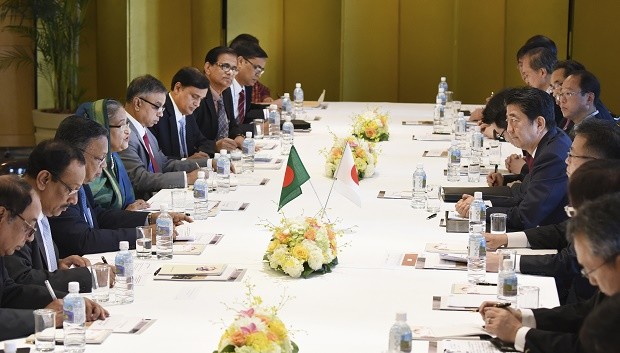
Bangladesh Prime Minister Sheikh Hasina, fourth left, speaks with Japanese Prime Minister Shinzo Abe, fourth right, during their talks in Nagoya, central Japan, Saturday, May 28, 2016. Hasina came to Japan to attend the Group of Seven summit meeting in Ise. AP
NAGOYA, Japan — Japanese Prime Minister Shinzo Abe is sharing a push by the Group of Seven advanced industrial nations to promote inclusive growth across the globe in meetings with leaders of seven developing countries.
The bilateral summit meetings with leaders of Bangladesh, Chad, Indonesia, Laos, Papua New Guinea, Sri Lanka and Vietnam in this central Japanese city on Saturday followed a gathering with G-7 leaders after their annual summit, which was held in a nearby seaside resort. Chad’s President Idriss Deby was representing the African Union at the meetings in Japan.
At that session, the leaders agreed to promote infrastructure development to help boost growth, Japanese officials said. They also voiced their support for the G-7’s stance on the need for peacefully settling territorial disputes according to law — a reference to frustrations over China’s growing presence in areas of the South China Sea also claimed by its neighbors.
READ: G7 says it’s ‘concerned’ by situation in East, South China seas
Laos, Bangladesh and Papua New Guinea are among the poorest nations in Asia. Vietnam and Indonesia are two of the fastest-growing developing economies. During the summit, Abe expressed strong concern over slowdowns in China and some other emerging economies that have sapped global growth at a time when Japan and European nations are struggling to keep their own recoveries on track.
A more than 50 percent plunge in commodity prices was a key signal of the risks to growth, Abe said.
“What we are concerned about the most is contraction of the world economy,” Abe said
Japan has pledged to increase its development assistance, help finance an insurance fund for health emergencies in the developing world and to offer training to thousands of people in the developing world as part of its own contribution to bridging economic disparities.
The G-7 meeting also endorsed an effort to help 500 million people in developing countries escape hunger and malnutrition by 2030.
READ: G7 leaders pledge collective action on sagging global growth